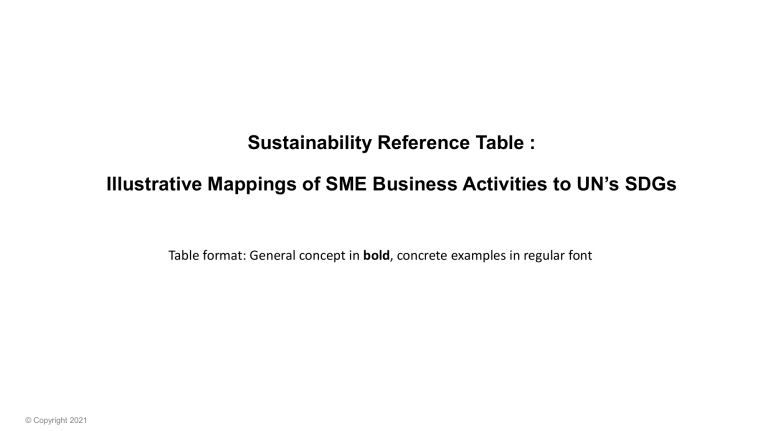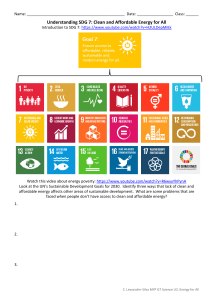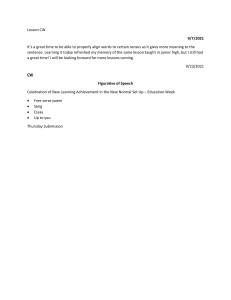
Sustainability Reference Table : Illustrative Mappings of SME Business Activities to UN’s SDGs Table format: General concept in bold, concrete examples in regular font © Copyright 2021 SDG #1 : No Poverty #2: Zero Hunger End poverty in all its forms everywhere. End hunger, achieve food security and improved nutrition and promote sustainable agriculture. Provide financial knowledge and training Host financial literacy workshops Sustainable food production through urban farming examples Provide affordable medical treatment Provide affordable consulting/diagnose services Provide greater access to medicines and treatments Increase proportion of take-home pay for workers and producers - Use fair-trade supply chains in manufacturing and selling - Increase wages to workers Increase affordability of items - Incorporate local suppliers in order to lower item prices, and offer these lower prices to the local public Develop products with higher nutrition for lower prices - Advocating for community gardening Installing urban farms Advocating to increase local production of fruits/vegetables Increasing accessibility to affordable fruits/vegetables Increasing use and access to agrotechnology Promote healthy and active living - Host programmes to involve parents in healthy eating - Promote healthy menus in institutions like schools/childcare centres - Advocacy and education for consumers on nutrition labelling Prevent and control nutritional deficiencies - Identify strategies to address stunting and wasting among children Provide vitamins/food to vulnerable group children Increase food security © Copyright 2021 Work to obtain 100% of suppliers’ harvest, including ‘ugly’ foods that can still be eaten Support microfinance initiatives to fund farmers to be self-sustainable Advocate for local land rights to maintain farmers’ access to their land SDG #3: Good Health & Well-being Ensure healthy lives and promote well-being for all at all ages. Ensure inclusive and equitable quality education and promote lifelong learning opportunities for all. Enhancing existing healthcare coverage and system delivery Access to STEAM education - - - examples #4: Quality Education - Provide better access to immunisation, sanitation, antenatal and perinatal care services Provide long-term chronic care closer to communities, particularly underserved communities Provide welfare programs for mothers in low income groups Provide healthcare devices such as AEDs to the public Provide alternative healthcare financing mechanisms - Establish mechanisms to allow the poor, low and middle income households to have access to healthcare Eradicating diseases (CDs and NCDs) - Promote research & development into preventative/control measures for diseases Promote higher levels of hygiene and sanitation Promote food safety and vaccinations for diseases that can be spread via contaminated food © Copyright 2021 - Provide platforms and infrastructure for learning and creating, e.g. MakerSpace Host educational programmes Provide access to digital materials like Arduino, 3D printing and robotics to schools and students Utilize edtech - Provide subsidized education to underprivileged communities Provide greater access to tertiary education via funding and scholarships #6: Clean Water and Sanitation #7: Affordable and Clean Energy Achieve gender equality and empower all women and girls. Ensure availability and sustainable management of water and sanitation for all. Ensure access to affordable, reliable, sustainable and modern energy for all. Promote women inclusion and the female agenda Provide greater access to clean pipe water Increase takeup of renewable energy products - - - examples SDG #5: Gender Equality - Advocate against gender-based violence Introduce measures to break male-dominated hierarchies in politics and work Commit to equal pay and shrinking the gender pay gap Assist women in finding and retaining jobs, and supporting equal social and economic rights Design solutions to help solve water scarcity Provide piping or filtering to rural areas Design solutions to better monitor water quality Promote better and more efficient water usage - - Replace existing non-renewable energy consuming items with renewable energy alternatives Provide greater access to renewable energy enablers like solar panels Educate employees/the public regarding water usage at home and at work Reduce energy consumption Promote cleaner lakes, rivers and other water sources - © Copyright 2021 Improving watershed infrastructure Commit to and carry out water pollution prevention measures Treat and clean industrial wastewater - - Incorporating smart sensors into machinery/rooms/office spaces to turn off when not in use Choose suppliers of materials with low carbon footprints examples SDG #8: Decent Work and Economic Growth Ensure inclusive and equitable quality education and promote lifelong learning opportunities for all. #9: Industry, Innovation and Infrastructure Build resilient infrastructure, promote inclusive and sustainable industrialization and foster innovation. #10: Reduced Inequalities Reduce inequality within and among countries. Sustain growth of business and e-economy Improve urban access Facilitating ownership of affordable homes - - - - Improve provision for child and elderly care, economic and societal support for parents Promote e-commerce and digitalisation of businesses Streamline access to business licenses and permits Equitable compensation for employees and increased labour participation rate - Linking skills certification with wage levels Increase number of high quality and high paying jobs Provide upskilling opportunities - Enhance digital and technology skills Host classes with technical and vocational skills © Copyright 2021 - Introduce alternative transport methods Provide options to consumers to use low-carbon supply systems, such as smart lockers or pick up points Introduce better safety measures in factories, malls, parks - Increase access to dignified, affordable housing Provide alternative financing mechanisms for home ownership Expand accessibility to internet/WiFi Support participation in entrepreneurship and investment in income generating portfolios Provide investment for new innovations and projects Provide jobs to underserved communities Provide flexible working schedules and Reinvest portion of profit into research and being transparent on selection criteria development Offer equal opportunity to employees, such Host projects and think tanks, and fund as women innovative and beneficial projects Support new markets and customer groups - Invest in smaller, often underrepresented groups, such as LGBTQ and ethnicities SDG #11: Sustainable Cities and Communities #12: Responsible Consumption and Production Make cities and human settlements inclusive, safe, resilient and sustainable. Ensure sustainable consumption and production patterns. Safe, affordable, accessible, mobility support-friendly transport systems Mainstreaming sustainable consumption and production - - examples - Develop solutions to ease transport access to those with mobility issues Promote safe transport systems like dedicated bicycle lanes or safe bus stops Promote low-carbon transport methods Improve travel through methods like traffic light optimization Strengthen cultural/natural heritage - Reducing waste generation Expanded recycling programmes Boost demand for green products and services Raise awareness for sustainable lifestyles and development Promote sustainable procurement practices Reduce plastic based packaging, and if unavoidable, use bioplastic Preserve cultural landmarks like street art Researching methods for a circular economy Inclusive and accessible green public spaces - Transform laneways into safe, greener areas Incorporate green technology into office buildings Urban community well-being programs, targeted towards youth, elderly, women and disabled - Provide educational activities for the public in several areas, e.g. arts, mental health, sports, social © Copyright 2021 - Upcycling materials to form new items Convert food waste into compost and fertilizer Use recycled products in companies’ supply chains SDG examples #13: Climate Action #14: Life Below Water Take urgent action to combat climate change and its impacts. Conserve and sustainably use the oceans, seas and marine resources for sustainable development. Strengthen resilience to climate-related hazards Protect ocean ecosystems - - Use biological pest control to reduce ocean pollution and biodiversity loss - Use phosphorus-free fertiliser in agriculture to reduce nutrient runoff - Use sails instead of fuel where possible in sea shipping - Invest in marine research and development Improve data analysis to provide more accurate real-time alerts Promote regular checking/cleaning of hazard-diverting resources, such as drains and pipes Integrate climate change measures into solutions and services - Introduce products that help with preservation/conservation, such as rain harvesting devices Swap to renewable energy from fossil fuels Raise awareness and education level on climate change mitigation, adaptation and impact reduction - Provide education programmes and training to employees regarding impact reduction Transition to Low Carbon - Protect forested areas as carbon sinks Expand green mobility in transport sector Improve urban/rural planning and focus on micro-mobility Increase takeup of renewable energy and improve energy efficiency Encourage use of biofuels © Copyright 2021 Avoid overfishing and bycatch - Commit to sustainable fishing in allowed areas and seasons Design solutions to alleviate bycatch issues, e.g. nets that allow smaller species to escape, while larger intended species are caught Advocate against unsustainable fisheries/fishing practices SDG examples #15: Life on Land #16: Peace, Justice and Strong Institutions #17: Partnerships for the Goals Protect, restore and promote sustainable use of terrestrial ecosystems, sustainably manage forests, combat desertification, and halt and reverse land degradation and halt biodiversity loss. Promote peaceful and inclusive societies for sustainable development, provide access to justice for all and build effective, accountable and inclusive institutions at all levels. Strengthen the means of implementation and revitalize the global partnership for sustainable development. Conserve and restore terrestrial and inland freshwater Strengthen social cohesion ecosystems (forests, wetlands mountains and drylands) Foster environments of mutual respect Protect biodiversity and natural habitats Enhance community mediation and Restore degraded land and soil interreligious mediation services Reduce and halt the degradation of natural habitats Enhance child protection and children’s rights and prevent extinction of threatened species Increase access to justice and prevent crime Promote sustainable management of forests and encourage reforestation - Carry out tree-planting programmes and campaigns Promote agro-tourism and agro-forestry Promote freedom of information and open data - Make data about the company publicly available Advocate for proper news sharing – avoiding fake news and inflammatory messages Inhibit corruption © Copyright 2021 Introduce no bribe policies Enhance partnerships for sustainable development - Participate in public-private partnerships to achieve a common goal Partner with institutions locally or internationally






